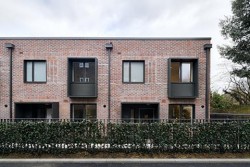White paper by MMC developer urges government to incentivise offsite building on brownfield land
Edaroth has called for action to unlock brownfield development sites, claiming more effective development on such plots could wipe out social housing waiting lists.
According to a new white paper by the Atkins-owned affordable housing developer, the capacity for building new homes on brownfield outstrips the waiting list demand in many parts of the country.
In Manchester, for instance, the social housing waiting list for 2022 was 14,912, while an estimated 75,585 homes could be built on brownfield sites within the city, according to Edaroth's analysis of the Brownfield Register.
Currently around 95,000 households are in temporary accommodation, which is costing the government up to £1.6bn annually.
Just 7,500 social homes were delivered in 2021/22 – way off the estimated 90,000 that need to be built every year to cut waiting lists.
Mark Powell, managing director at Edaroth, said savings made by transitioning households from temporary accommodation to social rented homes could offset the delivery of up to 14,000 new social homes annually.
"To beat the social housing emergency, I believe we must drive market reform and speed up planning with a presumption in favour of net zero compliant homes," he said.
"If we do this, we will be able to accelerate the delivery of energy-efficient, truly affordable homes. However if we continue to rely on traditional methods and approaches, I believe the housing crisis will deepen, with low-income households and the most vulnerable in our society feeling the harshest effects."
The white paper also urged the use of modern methods of construction – in which Edaroth specialises – to build sustainable homes quickly.
It called for increased incentives for local authorities, public sector bodies and housing associations to use MMC at scale.
Powell added: "To truly unlock the potential of MMC in the housing sector, we must create the right market conditions for the industry to flourish and grow.
"This represents a very real opportunity to provide the energy efficient net zero homes that people want and need, located in the communities where they want to live and thrive."









